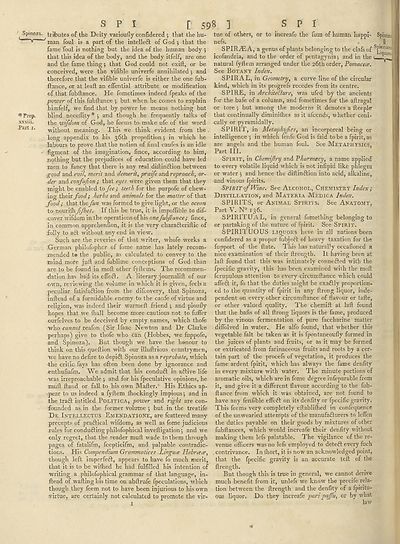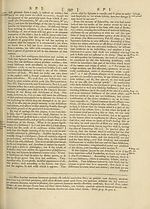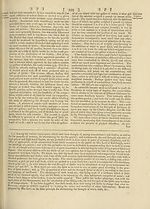Encyclopaedia Britannica, or, a Dictionary of arts, sciences, and miscellaneous literature : enlarged and improved. Illustrated with nearly six hundred engravings > Volume 19, Scripture-SUG
(648) Page 598
Download files
Complete book:
Individual page:
Thumbnail gallery: Grid view | List view

Spinoza.
* Prop,
xxsiii.
Part i.
tributes of the Deity varioully conlidered ; that the hu¬
man foul is a part of the intelleft of God } that the
fame foul is nothing but the idea of the human body ;
that this idea of the body, and the body itfelf, are one
and the fame thing $ that God could not exilt, or be
conceived, were the vifible univerfe annihilated 5 and
therefore that the vifible univerfe is either the one fub-
Itance, or at leaft an effential attribute or modification
of that fubftance. He fometimes indeed fpeaks of the
power of this fubftance ; but when he comes to explain
himfelf, we find that by power he means nothing but
blind neceflity * ; and though he frequently talks of
the wifdom of God, he feems to make ufe of the word
without meaning. This we think evident from the
long appendix to his 36th propofition 5 in which he
labours to prove that the notion of final caufes is an idle
figment of the imagination, fince, according to him,
nothing but the prejudices of education could have led
men to fancy that there is any real diftin&ion between
good and evil, merit and demerit, praife and reproach, or¬
der and confufion ; that eyes were given them that they
might be enabled to fee; teeth for the purpofe of chew¬
ing their food; herbs and animals for the tnatter of that
food; that the fan was formed to give light, or the ocean
to nourifhfifhes. If this be true, it is impuftible to dif-
cover wifdom in the operations of his onefubflance; fince,
in common apprehenfion, it is the very charafteriftic of
folly to a£t without any end in view.
Such are the reveries of that writer, whofe works a
German philofopher of fome name has lately recom¬
mended te the public, as calculated to convey to the
mind more juft and fublime conceptions of God than
are to be found in moft other fyftems. The recommen¬
dation has had its effecl. A literary journalift of our
own, reviewing the volume in which it is given, feels a
peculiar fatisfadlion from the difcovery, that Spinoza,
inftead of a formidable enemy to the caufe of virtue and
religion, was indeed their warmeft friend 5 and ploufty
hopes that we {hall become more cautious not to fuffer
ourfelves to be deceived by empty names, which thofe
who cannot reafon (Sir Ifaac Newton and Dr Clarke
perhaps) give to thofe who can (Hobbes, we fuppofe,
and Spinoza). But though we have the honour to
think on this queftion with our illuftrious countrymen,
we have no defire to depict Spinoza as a reprobate, which
‘the critic fays has often been done by ignorance and
enthufiafm. We admit that his condu£l in aftive life
was irreproachable ; and for his fpeculative opinions, he
muft ftand or fall to his own Mafter. His Ethics ap¬
pear to us indeed a fyftem fhockingly impious; and in
the traft intitled POLITICA, power and right are con¬
founded as in the former volume ; but in the treatife
De Intellectus Emendations, are fcattered many
precepts of practical wifdom* as well as fome judicious
rules for conducing philofophical inveftigation; and we
only regret, that the reader muft wade to them through
pages of fatalifm, fcepticifm, and palpable contradic¬
tions. His Compendium Grammatices .Litigate Hebrcece,
though left imperfefl, appears to have fo much merit,
that it is to be wifhed he had fulfilled his intention of
writing a philofophical grammar of that language, in¬
ftead of wafting his time on abftrufe fpeculations, which
though they feem not to have been injurious to his own
virtue, are certainly not calculated to promote the vir-
I
tue of others, or to increafe the fum of human happi- Spinoz;
nefs. .11 '
SPIRAEA, a genus of plants belonging to the clafs of
icofandria, and to the order of pentagynia; and in the > 4 s'li
natural fyftem arranged under the 26th order, Pomaces.
See Botany Index.
SPIRAL, in Geometry, a curve line of the circular
kind, which in its progrefs recedes from its centre.
SPIRE, in Architecture, was ufed by the ancients
for the bafe of a column, and fometimes for the aftragal
or tore ; but among the moderns it denotes a fteeple
that continually diminifties as it afcends, whether coni¬
cally or pyramidally.
SPIRIT, in Metapliyfics, an incorporeal being or
intelligence ; in which fenfe God is faid to be a fpirit, as
are angels and the human foul. See Metaphysics,
Part HI.
Spirit, in Chemiflry and Pharmacy, a name applied
to every volatile liquid which is not infipid like phlegm
or "water ; and hence the diftindlion into acid, alkaline,
and vinous fpirits.
Spirit of Wine. See Alcohol, Chemistry Index ;
Distillation, and Materia Medica Index.
SPIRITS, or Animal Spirits. See Anatomy,
Part V. N° 136.
SPIRITUAL, in general fomething belonging to
or partaking of the nature of fpirit. See Spirit.
SPIRITUOUS liouors hj.ve in all nations been
confidered as a proper fubjeft of heavy taxation for the
fupport of the ftate. This has naturally occafioned a
nice examination of their ftrength. It having been at
laft found that this was intimately connedled with the
fpecific gravity, this has been examined with the moft
fcrupulous attention to every circumftance which could
affedft it, fo that the duties might be exa6lly proportion¬
ed to the quantity of fpirit in any ftrong liquor, inde¬
pendent on every other circumftance of flavour or tafte,
or other valued quality. The chemift at laft found
that the bafis of all ftrong liquors is the fame, produced
by the vinous fermentation of pure faccharine matter
diflblved in w7ater. He alfo found, that whether this
vegetable fait be taken as it is fpontaneoufly formed in
the juices of plants and fruits, or as it may be formed
or extricated from farinaceous fruits and roots by a cer¬
tain part of the procefs of vegetation, it produces the
fame ardent fpirit, which has always the fame denfity
in every mixture with water. The minute portions of
aromatic oils, which are in fome degree infeparable from
it, and give it a different flavour according to the fub¬
ftance from which it was obtained, are not found to
have any fenfible effeft on its denfity or fpecific gravity.
This feems very completely eftablifhed in confequence
of the unwearied attempts of the manufa&urers to leflen
the duties payable on their goods by mixtures of other
fubftances, which would increafe their denfity without
making them lefs palatable. The vigilance of the re¬
venue officers was no lefs employed to deteft every fuch
contrivance. In ftiort, it is now an acknowledged point,
that the fpecific gravity is an accurate teft of the
ftrength.
But though this is true in general, we cannot derive
much benefit from it, unlefs we know the precife rela¬
tion between the ftrength and the denfity of a Ipiritu-
ous liquor. Do they increafe pan paffu, or by what
law
* Prop,
xxsiii.
Part i.
tributes of the Deity varioully conlidered ; that the hu¬
man foul is a part of the intelleft of God } that the
fame foul is nothing but the idea of the human body ;
that this idea of the body, and the body itfelf, are one
and the fame thing $ that God could not exilt, or be
conceived, were the vifible univerfe annihilated 5 and
therefore that the vifible univerfe is either the one fub-
Itance, or at leaft an effential attribute or modification
of that fubftance. He fometimes indeed fpeaks of the
power of this fubftance ; but when he comes to explain
himfelf, we find that by power he means nothing but
blind neceflity * ; and though he frequently talks of
the wifdom of God, he feems to make ufe of the word
without meaning. This we think evident from the
long appendix to his 36th propofition 5 in which he
labours to prove that the notion of final caufes is an idle
figment of the imagination, fince, according to him,
nothing but the prejudices of education could have led
men to fancy that there is any real diftin&ion between
good and evil, merit and demerit, praife and reproach, or¬
der and confufion ; that eyes were given them that they
might be enabled to fee; teeth for the purpofe of chew¬
ing their food; herbs and animals for the tnatter of that
food; that the fan was formed to give light, or the ocean
to nourifhfifhes. If this be true, it is impuftible to dif-
cover wifdom in the operations of his onefubflance; fince,
in common apprehenfion, it is the very charafteriftic of
folly to a£t without any end in view.
Such are the reveries of that writer, whofe works a
German philofopher of fome name has lately recom¬
mended te the public, as calculated to convey to the
mind more juft and fublime conceptions of God than
are to be found in moft other fyftems. The recommen¬
dation has had its effecl. A literary journalift of our
own, reviewing the volume in which it is given, feels a
peculiar fatisfadlion from the difcovery, that Spinoza,
inftead of a formidable enemy to the caufe of virtue and
religion, was indeed their warmeft friend 5 and ploufty
hopes that we {hall become more cautious not to fuffer
ourfelves to be deceived by empty names, which thofe
who cannot reafon (Sir Ifaac Newton and Dr Clarke
perhaps) give to thofe who can (Hobbes, we fuppofe,
and Spinoza). But though we have the honour to
think on this queftion with our illuftrious countrymen,
we have no defire to depict Spinoza as a reprobate, which
‘the critic fays has often been done by ignorance and
enthufiafm. We admit that his condu£l in aftive life
was irreproachable ; and for his fpeculative opinions, he
muft ftand or fall to his own Mafter. His Ethics ap¬
pear to us indeed a fyftem fhockingly impious; and in
the traft intitled POLITICA, power and right are con¬
founded as in the former volume ; but in the treatife
De Intellectus Emendations, are fcattered many
precepts of practical wifdom* as well as fome judicious
rules for conducing philofophical inveftigation; and we
only regret, that the reader muft wade to them through
pages of fatalifm, fcepticifm, and palpable contradic¬
tions. His Compendium Grammatices .Litigate Hebrcece,
though left imperfefl, appears to have fo much merit,
that it is to be wifhed he had fulfilled his intention of
writing a philofophical grammar of that language, in¬
ftead of wafting his time on abftrufe fpeculations, which
though they feem not to have been injurious to his own
virtue, are certainly not calculated to promote the vir-
I
tue of others, or to increafe the fum of human happi- Spinoz;
nefs. .11 '
SPIRAEA, a genus of plants belonging to the clafs of
icofandria, and to the order of pentagynia; and in the > 4 s'li
natural fyftem arranged under the 26th order, Pomaces.
See Botany Index.
SPIRAL, in Geometry, a curve line of the circular
kind, which in its progrefs recedes from its centre.
SPIRE, in Architecture, was ufed by the ancients
for the bafe of a column, and fometimes for the aftragal
or tore ; but among the moderns it denotes a fteeple
that continually diminifties as it afcends, whether coni¬
cally or pyramidally.
SPIRIT, in Metapliyfics, an incorporeal being or
intelligence ; in which fenfe God is faid to be a fpirit, as
are angels and the human foul. See Metaphysics,
Part HI.
Spirit, in Chemiflry and Pharmacy, a name applied
to every volatile liquid which is not infipid like phlegm
or "water ; and hence the diftindlion into acid, alkaline,
and vinous fpirits.
Spirit of Wine. See Alcohol, Chemistry Index ;
Distillation, and Materia Medica Index.
SPIRITS, or Animal Spirits. See Anatomy,
Part V. N° 136.
SPIRITUAL, in general fomething belonging to
or partaking of the nature of fpirit. See Spirit.
SPIRITUOUS liouors hj.ve in all nations been
confidered as a proper fubjeft of heavy taxation for the
fupport of the ftate. This has naturally occafioned a
nice examination of their ftrength. It having been at
laft found that this was intimately connedled with the
fpecific gravity, this has been examined with the moft
fcrupulous attention to every circumftance which could
affedft it, fo that the duties might be exa6lly proportion¬
ed to the quantity of fpirit in any ftrong liquor, inde¬
pendent on every other circumftance of flavour or tafte,
or other valued quality. The chemift at laft found
that the bafis of all ftrong liquors is the fame, produced
by the vinous fermentation of pure faccharine matter
diflblved in w7ater. He alfo found, that whether this
vegetable fait be taken as it is fpontaneoufly formed in
the juices of plants and fruits, or as it may be formed
or extricated from farinaceous fruits and roots by a cer¬
tain part of the procefs of vegetation, it produces the
fame ardent fpirit, which has always the fame denfity
in every mixture with water. The minute portions of
aromatic oils, which are in fome degree infeparable from
it, and give it a different flavour according to the fub¬
ftance from which it was obtained, are not found to
have any fenfible effeft on its denfity or fpecific gravity.
This feems very completely eftablifhed in confequence
of the unwearied attempts of the manufa&urers to leflen
the duties payable on their goods by mixtures of other
fubftances, which would increafe their denfity without
making them lefs palatable. The vigilance of the re¬
venue officers was no lefs employed to deteft every fuch
contrivance. In ftiort, it is now an acknowledged point,
that the fpecific gravity is an accurate teft of the
ftrength.
But though this is true in general, we cannot derive
much benefit from it, unlefs we know the precife rela¬
tion between the ftrength and the denfity of a Ipiritu-
ous liquor. Do they increafe pan paffu, or by what
law
Set display mode to:
![]() Universal Viewer |
Universal Viewer | ![]() Mirador |
Large image | Transcription
Mirador |
Large image | Transcription
Images and transcriptions on this page, including medium image downloads, may be used under the Creative Commons Attribution 4.0 International Licence unless otherwise stated. ![]()
| Permanent URL | https://digital.nls.uk/192703706 |
|---|
| Attribution and copyright: |
|
|---|
| Description | Ten editions of 'Encyclopaedia Britannica', issued from 1768-1903, in 231 volumes. Originally issued in 100 weekly parts (3 volumes) between 1768 and 1771 by publishers: Colin Macfarquhar and Andrew Bell (Edinburgh); editor: William Smellie: engraver: Andrew Bell. Expanded editions in the 19th century featured more volumes and contributions from leading experts in their fields. Managed and published in Edinburgh up to the 9th edition (25 volumes, from 1875-1889); the 10th edition (1902-1903) re-issued the 9th edition, with 11 supplementary volumes. |
|---|---|
| Additional NLS resources: |
|

